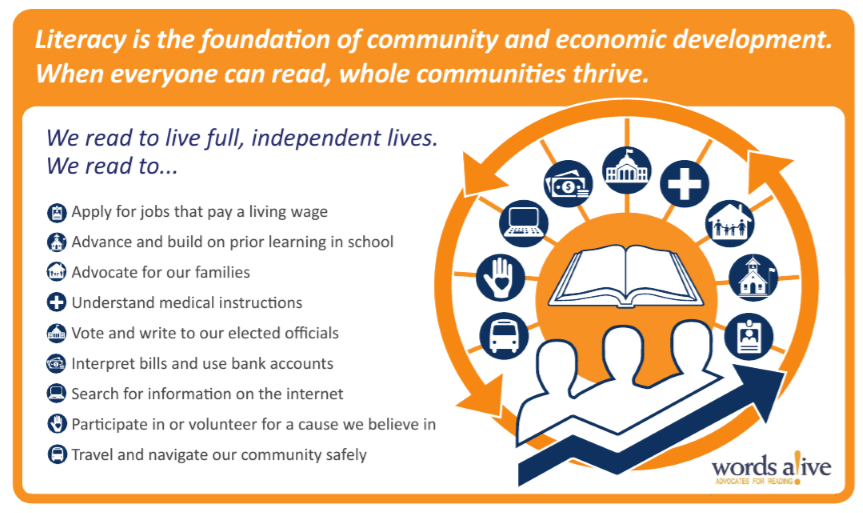If you have a minute, please fill out this simple form telling us how you found this blog post. Thanks!
By Jennifer Van Pelt
“Literacy is not a luxury, it is a right and a responsibility. If our world is to meet the challenges of the twenty-first century we must harness the energy and creativity of all our citizens.” (Bill Clinton, 1994)
Nearly 25 years ago, the President of the United States recognized the importance of literacy and the opportunity literacy provides not only individuals, but whole communities. In 2017, according to The Nation’s Report Card, only 36% of 4th graders in the United States were at a proficient reading level or above. These children are not the start of the cycle of illiteracy, but a continuation of the environment they were brought up in that didn’t prioritize reading -- often times because their parents were illiterate. This means these children weren’t read aloud to at home, they likely didn’t have any books in their house, and homework was a lone task. Studies have shown that 1 in 7 adults in America are considered functionally illiterate, which has the potential to trickle down to our youth.
What Does Illiteracy Really Mean?
Source: Words Alive; A graphic that says: "Literacy is the foundation of community and economic development. When everyone can read, whole communities thrive."
Being able to read is more than being able to escape into a book and be transported to a different decade or world. Illiteracy means that one can lack the skills necessary to read the dosage/warnings on medicine bottles, follow cooking instructions, properly manage finances, or apply for jobs that allow one to live above the poverty line. The cost of Illiteracy in the United States is estimated to be over 300 billion dollars, according to a report written by the World Literacy Foundation. In the same report, it is said to cost the global economy 1.2 trillion dollars.
How Do Other People’s Reading Abilities Affect the Economic Development of Your Community?
Perhaps one of the clearest ways to explain how literacy affects the economics of whole communities is illustrated by the correlation between literacy rates and prisons: 3 out of 5 inmates in United States prisons cannot read. Not only does this have an impact on the communities and families of these individuals, but taxpayers are paying for these prisons and all of the maintenance and costs they come with.
Health has also been shown to be affected by literacy rates. There have been multiple studies showing a correlation between communities with high literacy rates and lower infant mortality rates. The idea being that literate adults have increased ability and knowledge to seek out medical treatment for themselves and their families, as well as a difference in their reproductive behavior -- including increased contraceptive use. This results in more proactive visits to the doctor, generally at a lower cost, as opposed to high cost emergency visits.
For those with low literacy, it is often a struggle to obtain jobs that pay above a living wage. Furthermore, once they are in these jobs, it is difficult to be promoted or get a pay raise, vastly limiting their job mobility. This means that these employees will have more difficulties supporting their families and are more likely to depend on supplemental means of doing so such as welfare or food stamps.
According to a study conducted by Betty Hart and Todd Risley, there is a 30 million word gap between children in low-income families and children from higher income families. The report outlines their findings that an average child in a higher income family will experience nearly 45 millions words by the time they are 4 years old, compared to the 13 million words that an average child who lives in a low-income family will hear. Not only does this demonstrate the economic impact that illiteracy has on families, but also the continuous cycle of low literacy it creates.
The Connection Between Literacy and Politics
How can one be expected the equal opportunity to make a decision in upcoming elections when they aren’t provided with this information in a format that benefits them? In other words, how can you vote and advocate for yourself if you are unable to read voting information and instructions? Thirty-second commercials provide limited information, while the multitude of pamphlets and voting materials give the option to make a more educated choice. When the people of our communities are given the opportunity to obtain this info through multiple venues, they are more able to advocate for themselves and participate in causes they believe in.
When Everyone Can Read, Whole Communities Thrive
Communities built on a foundation of literacy will allow the creativity and energy of more voices to be heard and change our communities for the better through civic engagement, lessened costs (such as to our prison and healthcare systems), and a healthier society. The first step to beating illiteracy is right at your fingertips: get involved with local outreach groups, volunteer for literacy organizations (like Words Alive!), and donate books to schools, libraries, and other organizations that need them -- because illiteracy is 100% preventable.
You can help Words Alive connect students and families to the power of reading, so our communities can thrive, by making a $25 donation today. Click here!
Sources:
http://www.unesco.org/education/GMR2006/full/chapt5_eng.pdf
https://worldliteracyfoundation.org/wp-content/uploads/2015/02/WLF-FINAL-ECONOMIC-REPORT.pdf
https://www.arts.gov/sites/default/files/ToRead.pdf
http://media.wix.com/ugd/43406c_4ff5b27838a75af1e0ccd1cf55632342.pdf
https://www.nationsreportcard.gov/
https://www.aft.org/sites/default/files/periodicals/TheEarlyCatastrophe.pdf

